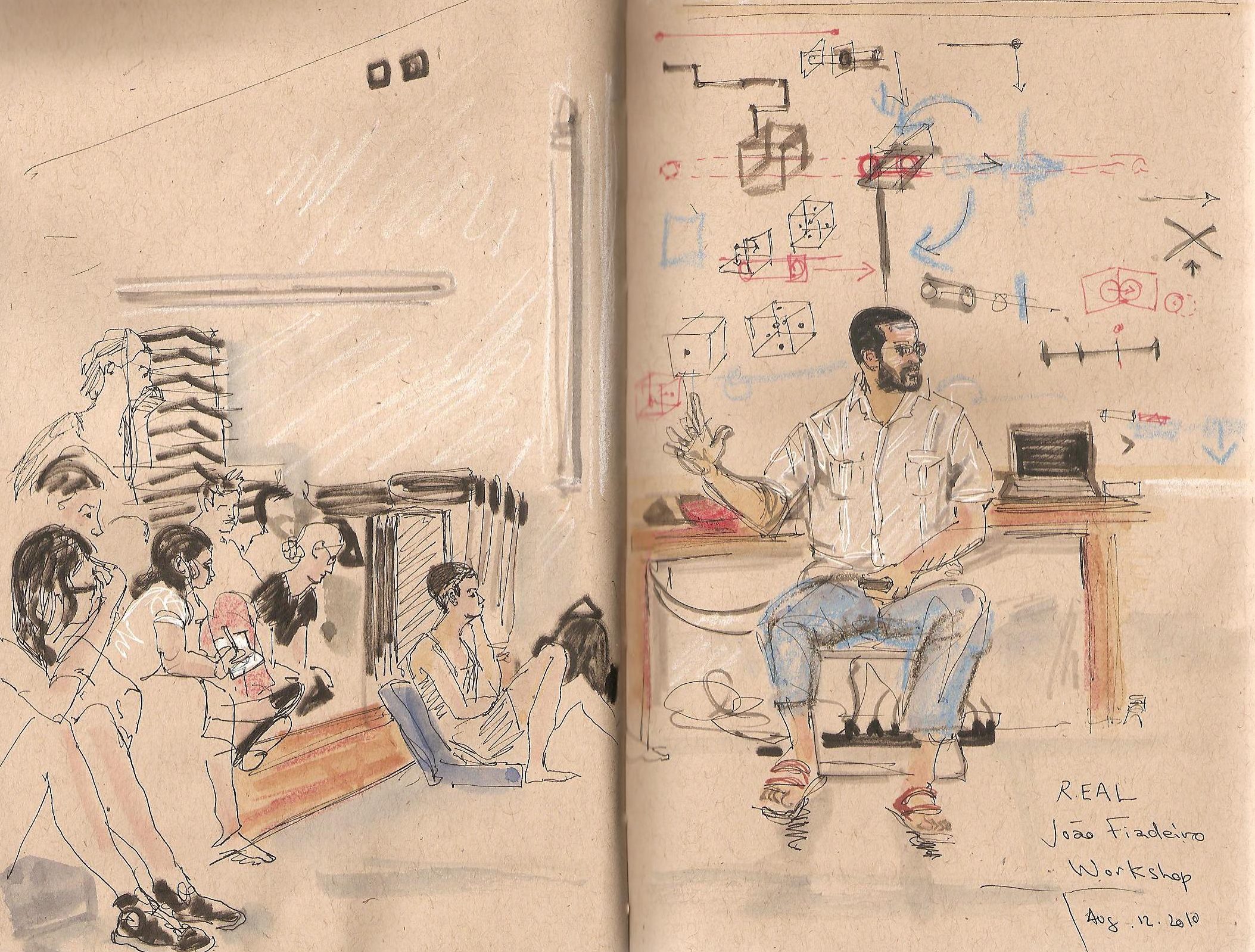real time composition
I would prefer not to
Herman Melville
João Fiadeiro works exactly with the matter of the ‘in-between’ and his Real Time Composition method (…) is based upon the challenge to produce – by cultivating molecular clarity – a re-assessment of what freedom in improvisation might be, as well as of what the creativity of the artist might be. (…) Fiadeiro has, so to say, woven a whole philosophy of the event applied to dance. His method, encompassed by the dense-light delicacy of simple things, does not deal with anything other than life; it is just a clarification of vital functioning, of the operative dynamics of human relations, of cohabitation.
Fernanda Eugénio
//

Drawing by Isabel Fiadeiro
Real Time Composition’s main drive comes from the need João Fiadeiro sensed early on in his career to create a system of principles and values to be used with his collaborators in the process of choreographing. Later it was asserted as a tool to explore modalities of dramaturgic writing within the dance field, and has been studied, developed and used by several artists and researchers. In the last few years it has been asserting in the territory of research at large thus widening its range of interest, positioning itself as a point of convergence between arts, sciences and daily life – and between the ethical, aesthetic and political questions that manifest therein.
//
The vocabulary used to describe many of the premises and principles that currently frame the practice of Real Time Composition, is the consequence of a close collaboration with many performers and practitioners who have worked closely with João Fiadeiro for the past 25 years, such as Cláudia Dias, Walter Lauterer, Arnold Noid, Márcia Lança, Carolina Campos or Daniel Pizamiglio (among many others), or theoreticians and researchers such as Rui Catalão, Paula Caspão, David-Alexandre Guéniot, Rita Natálio, Joris Lacoste, António Alvarenga, Emma Bigé or Fernanda Eugénio. The latter had a greater influence on the construction of the vocabulary used today, precisely because it was with her and within the framework of the AND_Lab project (2011-2014) they co-directed that, among many other initiatives, they focus in the processing and systematizing the the Operating Mode AND, a platform that hosted both Fiadeiro’s research through Real Time Composition, and Eugénio’s research, in what at the time she called “ethnography as situated performance”.
Here it is possible to access a selection of articles written during their collaboration published by the University of Chile in 2015, that contextualize some of the vocabulary and concept-tools used in Real Time Composition.
//
Since 1998 João Fiadeiro has been teaching intensively in the most relevant schools and master degrees in dance and performance studies in Europe, like Exerce ICI-CND in Montpellier; France; a.pass | Advance Performance and Scenography Studies, Bruxelas, in Brussels, Belgium; CAMPING, CND, Lyon and Paris; PReS Performance Research Studies, Kassel, Germany; DAS Choreography – Master in Choreography at Theatre Academy, Amsterdam, Holland; Dance Performance master at Uniarts at University of the Arts, in Helsinki, Finland; Performance Studies University of Hamburg Arts, Germany; SoDA (Solo Dance Authorship) at the University of Arts in Berlin, Germany; DASARTS, Theatre DasArts the University of Amsterdam Arts, Holland; Villa Arson, Nice, France.
He has been a regular guest teacher and researcher at Forum Dança in Lisboa, present in all of their formation programs since 1990: Contemporary Dance for Interpreters; Research and Choreographic Creation; Study, Research and Choreographic Creation; and Advanced Program of Creation in Performing Arts. In 2021-2022 he is the curator of the 5th edition of PACAP.
He has also taught workshops in private institutions in Lisbon, Almada, Tavira, Coimbra, Viseu and Porto (Portugal); Paris, Montpellier, Strasbourg, Lillie, Nice (France); Rio de Janeiro, Florianópolis, Fortaleza and Salvador de Bahia (Brazil); Frankfurt, Munich and Hamburg (Germany); Buenos Aires, La Plata (Argentina); Geneva, Lausanne (Switzerland); Barcelona, Madrid (Spain); Moscow, St. Petersburg (Russia); Prague (Czech Republic); Budapest (Hungary); Bucharest (Romania); Vienna (Austria), Aarhus (Denmark), Brussels (Belgium), Montreal (Canada), Perth (Australia), Santiago (Chile), Kiev (Ukraine), London (England), and Montevideo (Uruguay).